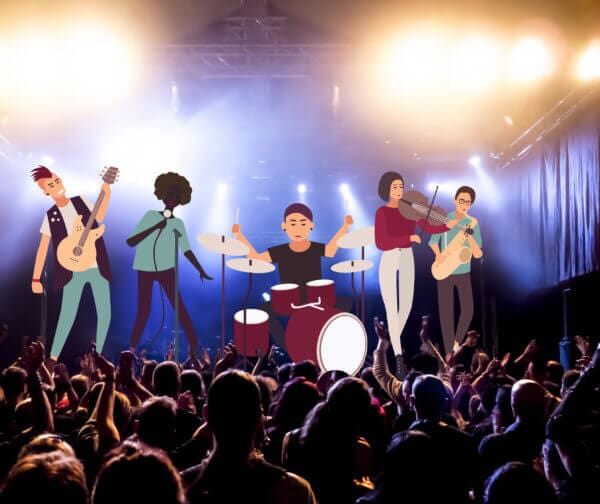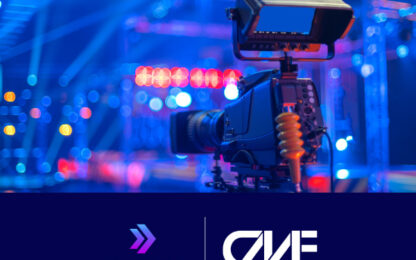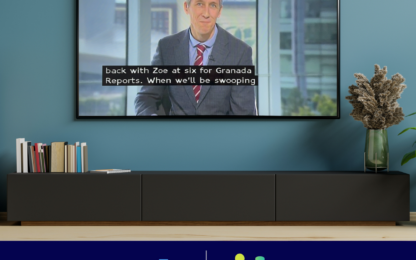
Famous Deaf People: 12 Deaf and Hard-of-Hearing Musicians
It’s a common misconception that deaf people can’t play or hear music.
Deafness is a spectrum, and even those who are profoundly deaf can feel music through vibrations.
Many talented musicians were born with hearing loss, and many have acquired hearing loss or tinnitus from the effects of prolonged exposure to loud music.
Below is a list of accomplished artists who have gone on the record about their hearing loss.
This article is part of our Famous Deaf People series! You can also read about famous deaf and hard-of-hearing actors and famous deaf people who changed the world on our blog.
Will.i.am
In 2010, multi-platinum Grammy Award winner and hip hop artist Will.i.am revealed that he suffers from tinnitus – a constant ringing in the ears, and that doctors told him he will eventually lose his hearing.
“I’m 43. When I went to the doctor and got an ear test, they said, ‘Your ears are that of someone a lot older.’” Will.i.am said in an interview. “In 2007, 2013 and this year, I got all my frequency tests and the curve … It’s proper loss.”
Watch Will.i.am speaking about tinnitus in this video.
Grimes
Canadian electronic artist Claire Boucher, who goes by the stage name ‘Grimes’, is known for her unique take on pop music and her artistic style.
Younger than many other musicians on this list, Grimes canceled multiple performance dates in 2012 due to her hearing condition, seeking to avoid further hearing loss.
Matt Maxey
Born with a profound hearing loss, Matt Maxey is the founder of DEAFinitely Dope. He’s also an American Sign Language (ASL) interpreter who joined Grammy-winning Chance the Rapper on his Be Encouraged tour in 2017.
“I always felt like I was too deaf for the hearing world, yet too hearing for the deaf world,” Maxey has said. “I think my situation is especially different with growing up in a hearing world, yet always working 10 times harder to hear with hearing aids and trying to lip-read what everyone is saying, knowing I can’t hear everything yet pretending that I could. If it was a group environment, forget about it.”
When Maxey interprets for artists like Chance the Rapper or D.R.A.M., it is not standard word-for-word ASL. An example Maxey uses is the term ‘turn up’. Saying that in conversation is very different than shouting it from a stage in song.
“I can have more of an impact going the unconventional route with someone like Chance and go into the areas nobody deaf has been able to get to before,” Maxey said. “It all leads to something that improves the community.”
“You see sign language in a lot more places than ever before. People are becoming more curious and at the same time more aware of what is going on with the deaf community,” he said.
Dame Evelynn Glennie
Scottish percussionist Dame Evelynn Glennie has been profoundly deaf since she was 12 years old. She has had a long and successful career as a musician and has collaborated with artists including Björk, Bobby McFerrin and Mark Knopfler.
Glennie has been outspoken about how misunderstood deafness is, explaining that she taught herself to hear with other parts of her body. She regularly performs in bare feet to feel the music.
Ludwig van Beethoven
One of the world’s most famous composers and classical musicians, Ludwig van Beethoven, began losing his hearing in his mid-to-late 20s.
In his 30s, Beethoven wrote to a friend, “For the last three years my hearing has grown steadily weaker. I can give you some idea of this peculiar deafness when I must tell you that in the theatre I have to get very close to the orchestra to understand the performers, and that from a distance I do not hear the high notes of the instruments and the singers’ voices. Sometimes too I hardly hear people who speak softly. The sound I can hear it is true, but not the words. And yet if anyone shouts, I can’t bear it.”
Beethoven, like many living in the 1700s, had many illnesses and poor medical treatment, and there is limited consensus surrounding the exact cause of his hearing loss. Some speculate it was due to illness or lesion of the inner ear, others suggest lead poisoning.
Beethoven still tried to perform and conduct long after many thought he should. In fact, when his Ninth Symphony premiered, Beethoven insisted on conducting. However, the orchestra knew he was not in the condition to conduct and hired another conductor to stand next to Beethoven. The musicians were told to ignore Beethoven’s directions.
While Beethoven’s public performances slowed until they came to a stop, he continued to compose until he died in his mid-50s. Beethoven’s housekeepers remembered that as his hearing got worse he would sit at the piano, put a pencil in his mouth, touching the other end of it to the soundboard of the instrument, to feel the vibration of the note.
2020 is the 250th anniversary year of Beethoven’s birth, and people continue to celebrate his legacy today.
Ayumi Hamasaki
Japanese pop star Ayumi Hamasaki began losing her hearing in 2000, and was diagnosed with inner ear disorder Ménière’s Disease in 2006. By 2008, she could no longer hear out of her left ear.
The ‘Empress of J-pop’ continues to produce album after album for her die-hard fans, and to-date, has released 17 albums since 1999.
Mandy Harvey
In 2017, Mandy Harvey performed an original song on America’s Got Talent and received the much-coveted Simon Cowel’s Golden Buzzer, enabling her to head to the final rounds of the competition.
Harvey has Ehlers-Danlos syndrome, a genetic disorder, and hearing loss as a result of the syndrome.
Harvey went to Colorado State University to pursue a degree in vocal music education. It was during this time that she lost the rest of her hearing. She left school for some time and reported suffering from depression.
However, she found her way back to music, including competing and wowing audiences on America’s Got Talent. Harvey has also published a memoir she co-wrote with Mark Atteberry, Sensing the Rhythm: Finding My Voice in a World Without Sound.
In this video from her performance on America’s Got Talent, Harvey explains how she feels music.
Neil Young
In 1991, another famed Canadian singer-songwriter, Neil Young, and the band Crazy Horse released a live concert album titled Weld. However, while mixing the live album, Young said it affected his hearing. “That’s why I really regret it,” he said. “I hurt my ears and they’ll never be the same again.”
At one point, Young decided to stop recording for a few years. His hearing loss also changed his creative path. Young cites his hearing loss as the reason for a creative shift towards the more ambient sound seen in his seminal album Harvest Moon.
“I made Harvest Moon because I didn’t want to hear any loud sounds. I still have a little bit of tinnitus but fortunately now I’m not as sensitive to loud sounds as I was for a year after the mixing of Weld,” he said. “My hearing’s not perfect, but it’s OK.”
Other noteworthy musicians who’ve had to cancel shows to preserve their hearing include:
- Phil Collins – Temporarily ended his career in 2011 due to hearing loss.
- Huey Lewis – Cancelled tour dates in 2018 due to hearing loss.
- Thomas Bangalter (half of Daft Punk) – No longer plays nightclubs due to hearing loss.
- AC/DC – Postponed the remainder of their 2016 tour due to singer Brian Johnson’s risk of ‘total hearing loss’.
Pete Townshend
The lead guitarist of the famed British rock group The Who has endured much damage to his hearing after almost half a century’s worth of writing and performing music to crowds around the world.
Pete now wears hearing aids and uses a special hearing monitor while performing. Pete has suffered from hearing loss since the 80s – opting to perform using an acoustic guitar behind a glass partition for the majority off the set during a 1989 reunion tour. In 2012, Townshend was forced to leave the stage as the onstage volume was too loud.
Fun fact: The Who earned an award from the Guinness Book of Records for the ‘loudest concert ever’ with their 1976 performance in London.
Sean Forbes
Hailing from Detroit, Sean Forbes is a deaf American rapper, activist, and speaker, who uses music to champion deaf awareness and Deaf culture.
“I became deaf at a couple of months old,” Forbes has said. I had a high fever and, although it was never officially diagnosed, it’s believed I became deaf as a result of spinal meningitis. I like to tell people that I became deaf because I was playing music too loud. (laughs) “
Forbes comes from a musical family. He got a drum kit at age 5, plays guitar, and writes his own music.
Outside of music, Sean co-founded D-PAN, the Deaf Professional Arts Network. D-PAN is a non-profit organization, which promotes accessibility and awareness in the arts and media industries.
Moby
Considered a pioneer of the electronic music scene, Moby has also been vocal about the professional hazard of loud music.
“When I first started playing in bands, I never wore hearing protection, and we played as loud as we possibly could,” Moby has said. “One night, I came home from a punk rock show and my ears were ringing, as they often did. And they were still ringing the next day. And the next. Ever since then, I’ve always worn some sort of hearing protection when exposed to very loud music because I realised that once my hearing is gone, it will never return.”
Lars Ulrich
Metallica drummer Lars Ulrich cites a loud Metallica tour in 1988 as the beginning of his incessant tinnitus and hearing loss, and his condition worsened over time until it would wake him up in the middle of the night.
“I would often fall asleep with the television on, and I would wake up in the middle of the night to go turn it off,” he said. “Except it wasn’t actually on. When I realized that I was doing that frequently, actually getting up to turn the TV off that wasn’t on to begin with, I realized that maybe I had some issues.”
Like many of his peers, he’s also an outspoken about the risks of over-exposure to noise.
If you want to know more about accessibility services for deaf and hard-of-hearing people – including captioning – you can get in touch with us at Ai-Media to discover our full range of services.


